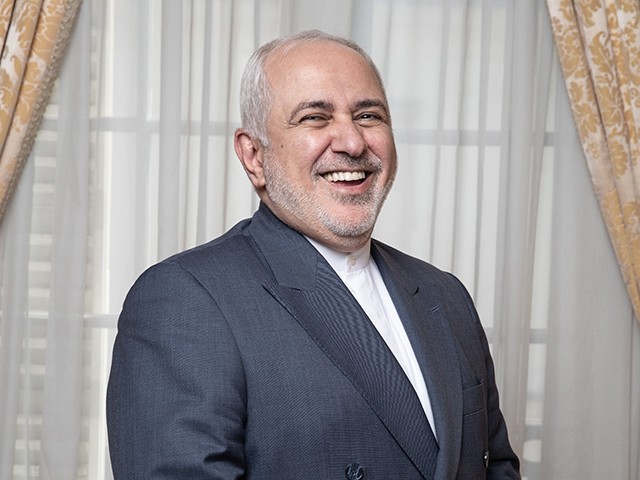Iranian President Hassan Rouhani reportedly ordered an investigation into how an Iranian outlet based outside of the country obtained audio of an hours-long conversation with Foreign Minister Mohammad Javad Zarif in which he repeatedly insulted dead Islamic Revolutionary Guard Corps (IRGC) leader Qasem Soleimani.
Iran International, a U.K.-based outlet focused on Iranian news that the regime considers hostile to its interests, published excerpts on Sunday from a bombshell interview Zarif gave Saeed Laylaz, a regime-friendly journalist, reportedly in early 2021. The outlet also reportedly published about 3 hours of raw audio of the discussion on Clubhouse. In the published remarks, Zarif complains that, despite being the nation’s top diplomat, he has “nil” input in the nation’s foreign policy due to IRGC intervention in his work. He particularly condemned Qasem Soleimani, the former head of the IRGC Quds Force, for allegedly conducting unauthorized diplomacy in places like Russia and Syria that made Zarif’s job extremely difficult.
In what appeared to be an enraged throwaway comment, Zarif protested that he found out about some Israeli military activity from former Secretary of State John Kerry, currently a climate envoy for President Joe Biden, before he found out from his own people.
As head of the Quds Force, Soleimani was in charge of Iran’s foreign terrorist activity and believed to be the architect of Iran’s interventions in Syria, Iraq, and Venezuela, among other countries. A U.S. drone strike ordered by former President Donald Trump killed Soleimani and the head of an Iraqi terrorist group, Hezbollah Brigades chief Abu Mahdi al-Muhandis, in January 2020.
The IRGC is a U.S.-designated foreign terrorist organization.
Zarif’s criticism of Soleimani after his death significantly contradicts the Iranian regime’s elevation of Soleimani to the status of an immortal martyr, worshipped at state-sponsored events on a regular basis. Despite this, the Iranian regime appears to be supporting Zarif amid the scandal.
The Iranian Foreign Ministry confirmed the authenticity of the interview Monday but insisted it was not meant to be an interview and Zarif believed himself to be fully off the record. Tehran claimed the conversation was meant for use as part of an “oral history” project on the regime.
On Tuesday, a spokesman for Rouhani announced a formal investigation into how audio of the conversation ended up in the hands of Iran International, focusing his ire on the “conspiracy” against Tehran rather than on Zarif’s comments against the most powerful wing of the Iranian government.
“The audio file was released by a vengeful television network, which is funded by petrodollars and has been fervently supporting the sufferings and intimidation of the Iranian nation ever since it was established,” the spokesman, Ali Rabiei, said Tuesday, according to the state-run outlet PressTV. “This is indicative of the fact that the interview was broadcast conspiratorially and selectively.”
“This theft of documents is a conspiracy against the administration, the establishment, domestic unison as well as our efficient and honorable institutions. It is a conspiracy against our national interests,” the spokesman continued. “The president has ordered the Intelligence Ministry to identify the agents of this conspiracy.”
Rabiei also defended Zarif, claiming that his remarks were “a cherry-picked excerpt from a very long interview, which was leaked for the sake of wicked intentions.” The “cherry-picked excerpt” was about three hours long.
The spokesman added that people were “being investigated” for having “stolen” the audio file, but did not elaborate on any individuals in particular being subjects of police probes or how many people may be involved, though the use of the word “conspiracy” suggests multiple suspects.
PressTV claimed that Iran International was partially funded by, and thus a front for, the government of Saudi Arabia.
Iran International followed up its own reporting by noting that government-controlled media outlets in the country also abstained from attacking Zarif’s blasphemous remarks against Soleimani, instead stoking ire against an individual suspected to have played a role in the leak: Hesamoddin Ashena, a media adviser to Rouhani.
“How can a political project be conducted from beginning to end by a body under the president’s supervision and then end up in the hands of anti-revolutionaries in London?” one pro-government newspaper, Farhikhtegan, reportedly asked. “Who will be answering for this historical scandal of the Rouhani government?”
The newspaper claimed the interview could be part of several similar leaks in the past that caused “formidable security blows” to the country.
The state-run Fars News Agency was reportedly the only major Iranian outlet to condemn Zarif, but it did so only in passing, treating Zarif’s remarks as unsurprising, according to Iran International.
“Zarif’s aberrant and discrepant stances … were not unbeknownst even before and have only become more evident with this audio file,” Fars shrugged.
Zarif is currently on a diplomatic visit to Qatar and Iraq and has not offered any explanations for the remarks. Zarif was in Baghdad, where the U.S. military attacked Soleimani and al-Muhandis, when the story broke.
The Iranian Foreign Ministry assured reporters that Zarif would offer “necessary explanations” regarding his remarks when he returned.
The published remarks featured significant griping against Soleimani in particular – notably not against the still-alive commander-in-chief of the entire IRGC apparatus, Major General Hossein Salami, or Soleimani’s successor Brigadier General Esmayeel Qaani. Zarif repeatedly complained that the Iranian state apparatus required him to yield to diplomatic requests from the IRGC but that he had “never been able to ask Soleimani to do something that would serve my diplomatic moves.” He also protested that Russia, which he accused of unauthorized diplomacy through Soleimani, attempted to sabotage the Joint Comprehensive Plan of Action (JCPOA), or 2015 Iran nuclear deal.
